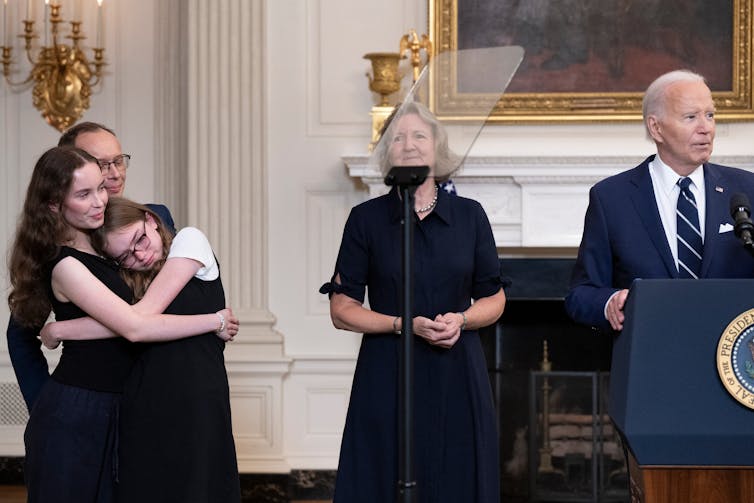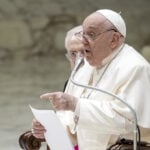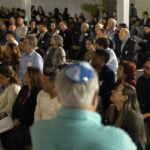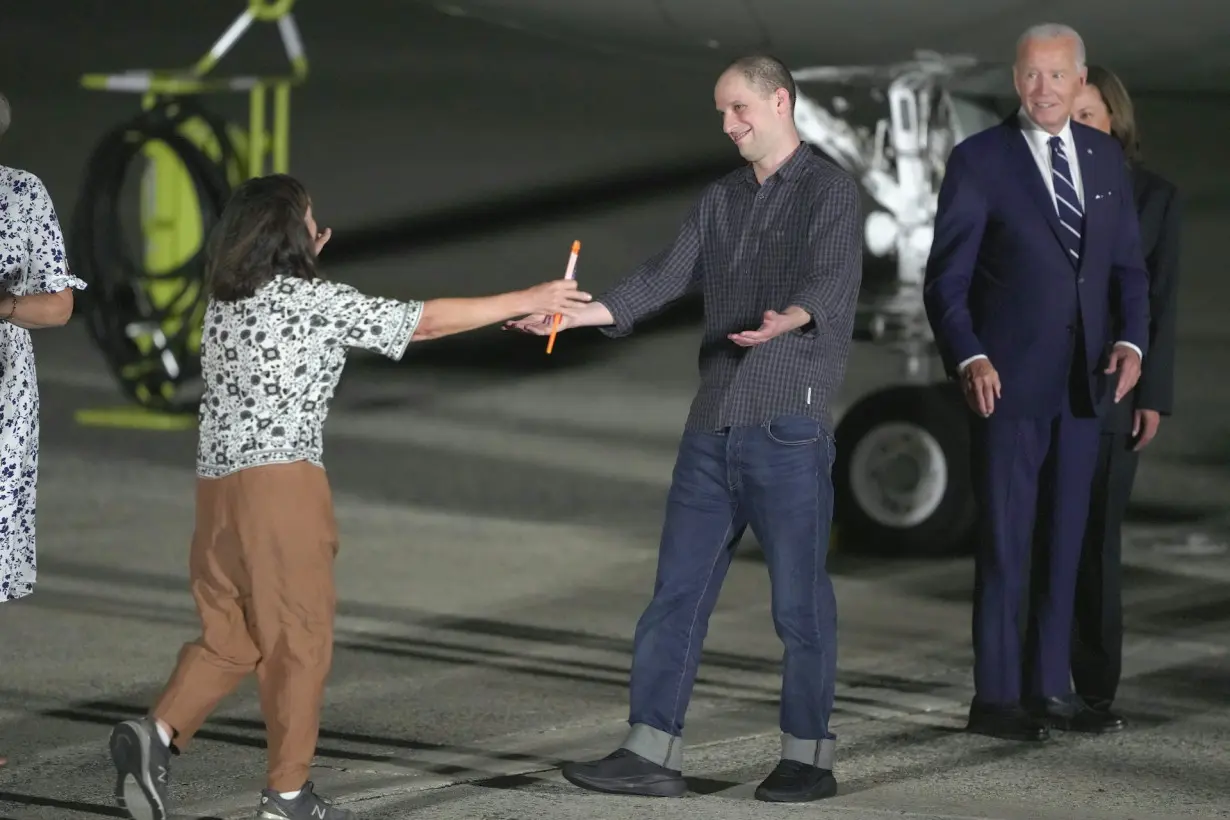Wall Street Journal reporter Evan Gershkovich and two other Americans were freed from Russia in a prisoner exchange on Aug. 1, 2024. In total, 24 prisoners, including 12 German nationals and eight Russians, as well as two children – who were not prisoners – were exchanged in Ankara, Turkey.
Described by The New York Times as “the most far-reaching exchange between Russia and the West in decades,” the deal was a complex agreement involving seven countries, including the United States, Slovenia, Turkey, Norway and Germany.
Some experts have called this kind of agreement “hostage diplomacy,” reflecting a growing trend of countries imprisoning foreigners on questionable grounds and using their potential release as political bargaining chips to achieve other goals.
What rules – informal or otherwise – help guide these sorts of delicate negotiations and eventual agreements? Amy Lieberman, a politics editor at The Conversation U.S., spoke with William Butler, a specialist in Russian and international law, to better understand this surprise prisoner release deal.
What stands out to you about this deal?
The scale is remarkable and is the largest ever U.S.-Russia prisoner swap.
Seven countries are involved and 26 people released, which is extremely unusual. Normally, there would be bilateral negotiations to release a small number of people.
It is important to understand that hostage and prisoner deals like this one are profoundly political exercises and not legal ones. There are no international treaties or international rules that determine how hostage and political prisoner releases should happen. All countries involved are at liberty to make the kind of deals they want to make, reflecting their own respective interests, on a case-by-case basis.
The real question is whether it would be better if there were some kind of international legal framework that would allow hostage and political prisoner releases to happen within a prescribed set of guidelines. In recent history, countries taking political prisoners and other foreigners hostage has become more common. A next step could be to set up international agreements that would institutionalize channels for hostage and prisoner release.

Some people released today had been detained in Russia for several years. Paul Whelan was imprisoned there for nearly four years. What factors can move these discussions along?
It is hard to know because these kinds of negotiations are done quietly, behind the scenes. People involved on all sides are under constraints about what can be disclosed.
Each case of a hostage or political prisoner exchange is a story of its own. There may be common political factors that are in play as countries get more experience with this issue and learn lessons about what to do and what to say or not.
Is there any other sort of informal playbook that countries might look to during these negotiations?
Each country has its own internal mechanism for dealing with this kind of negotiation. But because these discussions are highly political and secretive, they are not going to involve only junior or mid-level government officials. This is going to directly involve the heads of state agreeing to proceed with a particular decision.
On our end, that would mean the president, vice president and top people at the State Department would be involved in the negotiations.
The U.S. also has an internal mechanism set up so we can categorize U.S. citizens who have been “wrongly detained” by other countries. That is not making a judgment on our part as to guilt or innocence – that simply means that internally, as far as we are concerned, different government agencies and officials are involved in expediting the possibility of an exchange or release. For example, when basketball player Brittney Griner was detained, the first hurdle for supporters seeking her release was to persuade the U.S. government to classify her as “wrongly detained.”

Could this deal’s timing have been influenced by other factors, like Russia’s war in Ukraine or the presidential elections in the U.S.?
The timing of a particular deal like this is always fair game for speculation. I was personally interested when I saw that the trial of Evan Gershkovich, a Wall Street Journal reporter, was moved up by the court in July. I thought that was unusual. Gershkovich was sentenced in July to 16 years in a penal colony, following espionage charges that the Russian government has not provided any public evidence for and which the U.S. government and Gershkovich’s team have denied were true.
The connection with Gershkovich’s conviction and release remains to be demonstrated, but the timing of the trial may have indicated that the outcome was important for the timing of the release deal.
Gershkovich’s case was trickier than that of Griner, whom Russian authorities arrested and then detained for smuggling narcotics in March 2022. She was incarcerated and sentenced in August 2022 to nine years in prison for smuggling drugs, before the U.S. reached a deal with Russia and she was released in December 2022. Griner pleaded guilty to carrying narcotics into Russia.
With Gershkovich, we don’t know the exact Russian criminal code he was convicted under.
Are there any similarities between Griner’s and Gershkovich’s cases?
There may be a perfectly legitimate procedural reason that Gershkovich’s lawyers asked to move his trial date forward. But the Russians have been categorical in recent times in insisting anyone who is being exchanged as part of a deal with another country must be convicted first, rather than released before a trial. There is no reason to exchange an innocent – that is an unconvicted – person. Griner was also convicted before she was released to the U.S. If the individual has not been convicted, then he or she should be free to go – there is no question of an exchange.

William E. Butler does not work for, consult, own shares in or receive funding from any company or organization that would benefit from this article, and has disclosed no relevant affiliations beyond their academic appointment.
Source: The Conversation

 German Christmas market ramming is the latest attack to use vehicles as deadly weapons
German Christmas market ramming is the latest attack to use vehicles as deadly weapons
 What we know about the suspect behind the German Christmas market attack
What we know about the suspect behind the German Christmas market attack
 How to save a fentanyl victim: Key facts about naloxone
How to save a fentanyl victim: Key facts about naloxone
 Pope Francis reprimands Vatican staff for gossiping in annual Christmas message
Pope Francis reprimands Vatican staff for gossiping in annual Christmas message
 In a calendar rarity, Hanukkah starts this year on Christmas Day
In a calendar rarity, Hanukkah starts this year on Christmas Day
 Russia's UK embassy denounces G7 loans to Ukraine as 'fraudulent scheme'
Russia's UK embassy denounces G7 loans to Ukraine as 'fraudulent scheme'
 Drones continue to buzz over US bases. The military isn’t sure why or how to stop them
Drones continue to buzz over US bases. The military isn’t sure why or how to stop them
 Senate passes RFK Stadium land bill, giving the Washington Commanders a major off-the-field win
Senate passes RFK Stadium land bill, giving the Washington Commanders a major off-the-field win
 Tiger Woods says his son Charlie beat him in a round of golf for the first time, but only on a nine hole course
Tiger Woods says his son Charlie beat him in a round of golf for the first time, but only on a nine hole course
 Philadelphia 76ers star Joel Embiid working through injuries and mental health struggles
Philadelphia 76ers star Joel Embiid working through injuries and mental health struggles
 Reporter Evan Gershkovich is greeted on the tarmac by his mother, Ella Milman, as President Joe Biden and Kamala Harris look on at Andrews Air Force Base in Maryland on Aug. 2, 2024.
Reporter Evan Gershkovich is greeted on the tarmac by his mother, Ella Milman, as President Joe Biden and Kamala Harris look on at Andrews Air Force Base in Maryland on Aug. 2, 2024.







